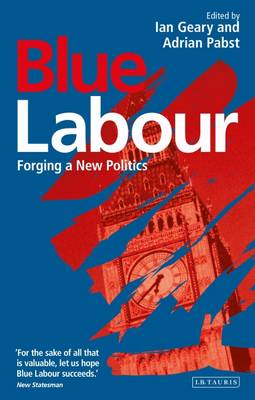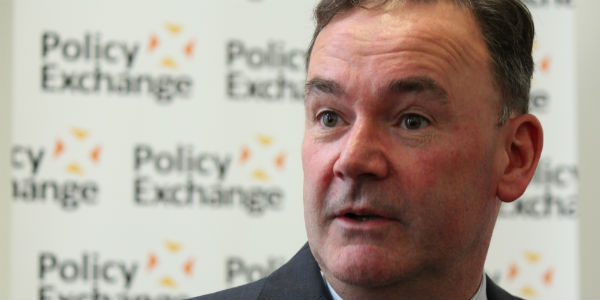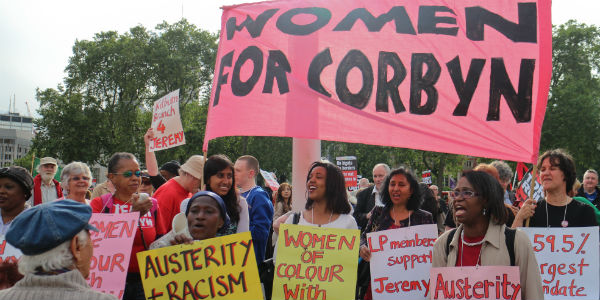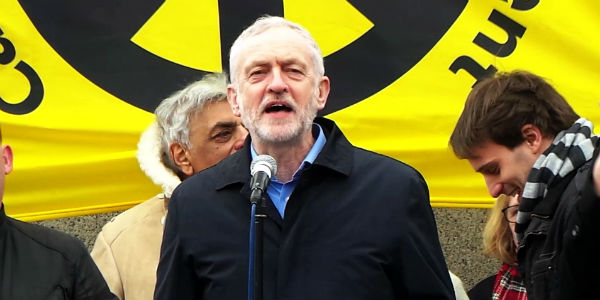Book review: Blue Labour: Forging a New Politics, ed. Ian Geary and Adrian Pabst
Jeremy Corbyn has been re-elected leader of the Labour party. Yet the ‘Blue Labour’ strain – a tendency grouped around the social thought of Maurice Glasman that emerged within the party after the financial crash – is far from over . J.A. Smith reviews Ian Geary and Adrian Pabst‘s edited volume, Blue Labour: Forging a New Politics, reflecting on how to understand this brand of Labour in the continuing age of Corbyn.
Blue Labour: Forging a New Politics. Ian Geary and Adrian Pabst (eds). I.B. Tauris. 2015
 In a Newsnight interview following the launch of his leadership challenge against Jeremy Corbyn, Owen Smith spoke of ‘the way in which people have a very strong – perhaps socially conservative – sense of place’, adding that ‘Jeremy’s got a rather more metropolitan sense of that […] a set of liberal perspectives on things: nationalism and patriotism aren’t really part of his make-up’. Smith’s idiom here – if not his slightly antithetical support for a second referendum on Britain’s EU membership – gave a flavour to his candidature of ‘Blue Labour’: a tendency in the Labour Party grouped around the social thought of Maurice Glasman that emerged after the financial crash. The pro-immigration internationalist Corbyn remains, but an article by Labour MP Rachel Reeves arguing that ending the free movement of people from Europe should be Labour policy suggests the Blue Labour strain is far from over within the Party.
In a Newsnight interview following the launch of his leadership challenge against Jeremy Corbyn, Owen Smith spoke of ‘the way in which people have a very strong – perhaps socially conservative – sense of place’, adding that ‘Jeremy’s got a rather more metropolitan sense of that […] a set of liberal perspectives on things: nationalism and patriotism aren’t really part of his make-up’. Smith’s idiom here – if not his slightly antithetical support for a second referendum on Britain’s EU membership – gave a flavour to his candidature of ‘Blue Labour’: a tendency in the Labour Party grouped around the social thought of Maurice Glasman that emerged after the financial crash. The pro-immigration internationalist Corbyn remains, but an article by Labour MP Rachel Reeves arguing that ending the free movement of people from Europe should be Labour policy suggests the Blue Labour strain is far from over within the Party.
As Ian Geary and Adrian Pabst’s essay collection, Blue Labour: Forging a New Politics, explains, Blue Labour began by seeking to offer an alternative to ‘the fusion of social with economic liberalisation under the joint aegis of the central bureaucratic state and the global ‘‘free market’” that, while keeping New Labour in power for more than a decade, saw it lose its traditional voter base by the millions. In place of the societal model he represents as two related kinds of ‘liberalism’ – social and market – undergirded by the illiberal centralising of the modern state, Glasman counselled a turn to the language of belonging, of place and even of belief, as part of a recognition that Labour’s natural supporters are far more socially conservative than ‘the metro-liberal self-righteousness’ of Westminster had been willing to acknowledge. Eager to make his leadership a break with New Labour, Ed Miliband installed Glasman in the House of Lords and briefly employed him as an informal policy advisor, before appointing another denizen of the project, Jon Cruddas, MP for Dagenham and Rainham, as chair of his Policy Review in 2012.
Four months after Miliband’s fall, and several weeks after Corbyn’s first leadership victory, Cruddas addressed a reiteration of Blue Labour principles to the Mile End Institute, arguing that ‘Labour needs to be connected to the common sense of the British people’. Disconnection from this, apparently, was the common shortcoming of three projects as wildly different as Labour under Blair/Brown, Miliband and now Corbyn. A great deal of store is set by this ‘common sense’ in Blue Labour. As Pabst puts it,
‘it is about reconnecting with people as they are – as human beings who belong to families, localities and communities and who are embedded in shared traditions, interests and faiths.’
Before addressing what is limited about this, it is worth pointing out that these words contain one of the real strengths of the project. Until the return of Corbyn’s brand of Left collectivism, there really wasn’t any other grouping in mainstream politics that was willing to hazard a way of talking about culture that didn’t reduce it to the possessive individualism of isolated subjects: each a small business unto themselves. Blue Labour was alone in recognising that culture is the innumerable intersections that – for better or worse – constantly attach us to other people, and that a politics capable of recognising that is a valuable prospect.
As Pabst continues, Blue Labour regards people ‘neither as lone egos nor as anonymous mass, but as relational beings’. But while he and his colleagues refer to the ideological prioritising of the ‘lone ego’ found in Thatcher, Blair and Cameron alike as ‘liberalism’, those of other political or intellectual stamps could as well call it ‘neoliberalism’, ‘liberal humanism’ or even just ‘capitalism’. The critique of the ‘lone ego’ is as much a tradition of the Right as of the Left. It takes in the ‘impersonality’ of a T.S. Eliot as much as the ‘antihumanism’ of 1968. While conservative and radical cultural critics may both balk at what they regard as the undue privileging of the ‘lone ego’ that is the keystone of contemporary ideology, where they differ is in what they regard as a positive alternative.

Jon Cruddas in 2013. Photo: Policy Exchange via a CC-BY 2.0 licence
Floating through the arguments of Blue Labour is the old philosophical idea of ‘the Good’: the ideal way of pursuing life that could bring everyone together. The problem is that while ‘families, localities and communities […] embedded in shared traditions, interests and faiths’ sounds like a fairly uncontroversial place to try to locate this, doing so immediately excludes the many people for whom family, or the place or faith of their upbringing, is very far from being such a transcendentally benevolent force in their lives. In fact, the conservative version of seeing people as ‘relational beings’ always ends up idealising certain forms of those relations, and those who don’t fit in with them be damned. Frank Field’s remark in this volume, that Labour must shed its reputation as the party of ‘the newcomer and the social misfit’, suggests that such exclusions are not in this case unconscious. But even if we dismiss such hand-wringing as so much ‘metro-liberal’ fetishising of difference, the conservative reading still assumes that the culturally-grounded person, the normative person, for whom ‘the traditional model remains […] the ideal to aim for’, will of necessity find consistent happiness within ‘the Good’. As I have detailed in a quite different context, it does not seem likely to me that this is the case. All of us are newcomers and misfits sometimes, not least in our own hometowns. While a politics that acknowledges us as ‘relational beings’ is highly desirable, it helps no one to pretend that there exists a ‘Good’ form of relation that would be uniformly beneficial when applied to everybody.
If Blue Labour’s dependence on a prescriptive notion of ‘the Good’ is problematic in this way, then analogous problems are found in its claim to ‘common sense’. One of the main things populist politicians are always accused of doing is making the undue claim that they speak for ‘the people’, even though, of course, a certain measure of this gesture is actually inherent in all representative democracy. Even allowing for this, however, it is striking how frequently ordinary people’s views are ventriloquised and generalised in the Blue Labour volume without much in the way of evidence. This is despite the fact that Cruddas himself has plenty of experience dealing with opinion polling: an example from which will demonstrate why, in idealising ‘the common sense of the British people’, Blue Labour runs into problems.
Heading an independent inquiry into Labour’s defeat in the General Election of 2015, Cruddas announced in August 2015 that his polling suggested that Labour lost because they were perceived as being ‘anti-austerity’. These findings were reiterated in the full report the following May: just one month before the EU Referendum that ended the careers of austerity’s architects at the top of the Conservative Party, and brought in a new Tory leadership whose language has since been all about fiscal stimulus and tackling inequality. An austerity agenda condemned by such Leftist zealots as the IMF, the Obama administration and The Economist was consigned to the dustbin; besides, George Osborne’s cuts – damaging as they were – were not generally as tough as his rhetoric.
Where was the ‘common sense of the British people’ in all this? According to Cruddas’s research, it was getting behind a now discredited economic programme, whose executioners were not even that convinced by it in the first place. If Cruddas had had his way, Labour would have been outflanked on the Left by one of the most draconian former Home Secretaries of recent times. It is one thing to say, with traditional political cynicism, that a party must indulge some of the errors of the electorate if it is to hope to alter them, but to elevate what are – to put it lightly – contestable opinions to the high rung of ‘common sense’ is – like the analogous elevating of certain kinds of lifestyle to the status of ‘the Good’ – a dangerous thing, and likely to catch one out.

Corbyn supporters celebrate his re-election at a rally in Parliament Square on 27 June 2016. Photo via a CC-BY-NC-SA 2.0 licence
In this regard, a small textual slippage in the volume is revealing. When Cruddas’s essay (written, like the main parts of the book, before the 2015 election) turns to ‘austerity’, it is with this statement:
On one thing we can agree, however: austerity is a reality. The state of our public finances is not acceptable.
The reason we all can – or could – agree on this, is that it is an equivocal statement. ‘Austerity is a reality’ may mean either ‘it is the only approach to repairing our public finances’, or ‘it’s happening whether we like it or not, so we need to accept and work with that’. If this seems like a fussy over-reading, then look what happens when we turn to Pabst’s main contribution in the book. We find – with no indication that it is a quotation – the precise phrase again:
austerity is a reality. The state of public finances and household debt is not acceptable.
This ‘common sense’ about austerity can only be manufactured by the repetition of what was already a prevaricating fudged statement: one that one author obviously thought a helpful enough fudge to copy from the other. The impression that we have left the complexities of economic reality behind in order to perform this feat is reinforced by Pabst’s addition to the sentence: ‘and household debt’. What has austerity got to do with household debt, except for the fact that the former risks exacerbating the latter by moving strains on public services to the private finances of individuals?
‘Common sense’ is something of a devil’s pact, because once one has committed to it, it is too easy to end up offering rationalisations – or a fig leaf – to widely held, but misinformed, or even outright sadistic opinions … or to be left denying such things exist. Blue Labour has been most controversial in advocating on mainly cultural grounds a shift to ‘relatively low and highly selective immigration’, of which David Goodhart provides the main statement in the volume. As this has been the focus of much attention on Blue Labour elsewhere, I will limit my comments to the closing statement of Goodhart’s essay. Having conceded the extraordinary structural changes required to wean the British economy off immigration on its present scale, Goodhart concludes that while ‘there will be some economic costs even if the disentanglement is well managed […] this is a price that people seem happy to pay for a return to moderate levels of immigration’. These are striking words after the EU referendum result, a moment when the electorate defied the old Clintonite orthodoxy of ‘it’s the economy stupid’, and revealed that there is one issue that it is prepared to risk enormous economic unrest over. Whether Goodhart would feel the highly racialised and mendacious ‘Leave’ campaign, and the spate of racist attacks that followed it, represented British ‘common sense’ and came from the best of motives is unclear.
What of Blue Labour in the age of Corbyn? Joining a political party always involves attaching one’s name to a project that one will only ever partially believe in. Party members grit their teeth through individual policy decisions (or even entire decades) when they don’t personally share the party line, in order to bring about those aims they do agree on. The political theoristJodi Dean has recently gone as far as to suggest that this ‘gap’, this space of tension between member and party, may be thought of less as some kind of glitch or necessary evil of the party model than as precisely the generative space where politics takes place. We can push this further to say that whole political tendencies can make gains from a similar kind of tension. And this, I think, is the trick Blue Labour is missing with its general dislike of Corbyn.

Jeremy Corbyn at a Stop Trident demonstration in February 2016. Photo: Gary Knight via a CC-BY 2.0 licence
It is easy to see how Corbynism must seem like a disaster to many Blue Labour thinkers, even if Cruddas has shown more willingness to reach out to Corbyn’s ordinary followers than many MPs. Quite apart from Corbyn’s desire to fight public prejudice on austerity and immigration, the determination in his team to return a dynamic role to the state contravenes what sometimes feels like a ‘style guide’ rule within the Blue Labour volume: that any criticism of capitalism must immediately be balanced by a criticism of state interventionism. And yet, reading this book today also creates a feeling of ‘be careful what you wish for’, since many of its concrete demands, which seemed rather fanciful in early 2015, have been met by Corbynism, albeit not in the hoped-for form.
Labour transformed into a ‘social movement’? An alternative to neoliberalism’s atomised culture of the self? A break with the centralised managerialism of the state? Populist ‘common sense’ aside, these are the pillars of the Blue Labour prospectus, and each is being held out by Corbyn. Labour now has the biggest Left-wing party membership in Europe, and it is motivated to move into areas of life not conventionally considered political, from local music to childcare. Greater public participation in policymaking, meanwhile, is also fundamental to Corbyn’s plan. Making the transition from speculative manifesto to actual lived politics means being willing – in something like the way Dean describes – to seize political developments when they present themselves, even if they do not quite resemble what it was we initially expected or hoped for. Corbyn’s coalition of educated city-dwellers, the young, old professional protesters and disaffected people who might otherwise have joined UKIP is hardly the alliance of vicars and white van men Blue Labour projected, but it does have the virtue of actually existing.
This review gives the views of the author, and not that of Democratic Audit. It was first published at the LSE Review of Books.
J.A. Smith’s Other People’s Politics appears with Zero Books next year. He is a lecturer at Royal Holloway, University of London. Read more by J.A. Smith





 Democratic Audit's core funding is provided by the Joseph Rowntree Charitable Trust. Additional funding is provided by the London School of Economics.
Democratic Audit's core funding is provided by the Joseph Rowntree Charitable Trust. Additional funding is provided by the London School of Economics.
Book review: #BlueLabour – Forging a New Politics, ed. Ian Geary and Adrian Pabst
https://t.co/VgbMeN9Pbm cc @KSeibertAu
‘It is easy to see how Corbynism must seem like a disaster to many Blue Labour thinkers’: book review https://t.co/OPNjayRdBU
Book review: Blue Labour: Forging a New Politics, ed. Ian Geary and Adrian Pabst https://t.co/jyewZuixlS
Book review: Blue Labour: Forging a New Politics, ed. Ian Geary and Adrian Pabst https://t.co/OPNjayRdBU
Book review: Blue Labour: Forging a New Politics, ed. Ian Geary and Adrian Pabst https://t.co/d2GYQ4Kn5R
Book review: Blue Labour: Forging a New Politics, ed. Ian Geary and Adrian Pabst https://t.co/OPNjayzCdk https://t.co/JjGg4M17Fw